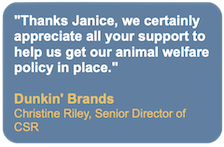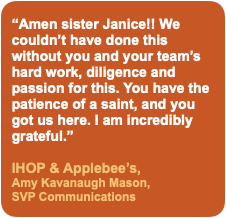With experience in developing Animal Welfare & Antibiotics Policies for Fortune 500 and growing companies, and with Dr. Temple Grandin as our advisor, we write, review and fine-tune pragmatic policies. Post-pandemic, the need for food has never been higher, while state regulations, investors, NGOs, and consumers are all demanding transparency of your animal protein supply chain. Our approach includes competitive landscape analysis and aligning your brand values with consumer demand while satisfying other key stakeholders.
Corporate Animal Welfare Policies & Positions
As a boutique Animal Welfare Consultancy, Sustainable Solutions understands complex animal welfare issues, including gestation crates, cage-free eggs, free-range meat and dairy, and antibiotic and growth hormone issues. Our animal welfare consultants understand industry positions and your competitors’ positions. We know supply limitations and recommend a phased Crawl-Walk-Run approach using our Responsible Sourcing Roadmap.
You need humane policies to satisfy state regulation deadlines, such as California’s Prop 12 and Massachusetts Question 3. You need humane policies to provide input into the BBFAW Report, the Antibiotics Chain Reaction Report, the Egg Track Report and more, for your brand to get the credit you deserve.
You need humane policies to satisfy state regulation deadlines, such as California’s Prop 12 and Massachusetts Question 3. You need humane policies to provide input into the BBFAW Report, the Antibiotics Chain Reaction Report, the Egg Track Report and more, for your brand to get the credit you deserve.
Antibiotic Policy
We have expertise in guiding you to respond to the Antibiotics Chain Reaction report.
A recent study by the CDC and Pew Charitable Trust (PEW) indicates that 70%+ of antibiotics critical for human medicine sold in the U.S. are used in livestock and poultry production, not for human medical use. The volume of medically important antibiotics sold for use in farmed animals needs to be reduced.
Evidence is mounting showing that routine low-dosage use of antibiotics in farmed animals is negatively affecting human health. According to the World Health Organization (WHO), the Centers for Disease Control and Prevention (CDC), and other public health agencies, antibiotic resistance is a leading global public health threat. At least 2 million people in the U.S. contract antibiotic-resistant infections, and at least 23,000 die as a result of the infections each year.
Antibiotic resistance happens when bacteria change to become stronger and resistant to the antibiotics used to treat the bacterial infection. As a result, the infection is no longer killed by the antibiotics, and more potent antibiotics must be used. However, these are not always available, as resistance can happen faster than stronger antibiotics are being discovered and developed.
A recent study by the CDC and Pew Charitable Trust (PEW) indicates that 70%+ of antibiotics critical for human medicine sold in the U.S. are used in livestock and poultry production, not for human medical use. The volume of medically important antibiotics sold for use in farmed animals needs to be reduced.
Evidence is mounting showing that routine low-dosage use of antibiotics in farmed animals is negatively affecting human health. According to the World Health Organization (WHO), the Centers for Disease Control and Prevention (CDC), and other public health agencies, antibiotic resistance is a leading global public health threat. At least 2 million people in the U.S. contract antibiotic-resistant infections, and at least 23,000 die as a result of the infections each year.
Antibiotic resistance happens when bacteria change to become stronger and resistant to the antibiotics used to treat the bacterial infection. As a result, the infection is no longer killed by the antibiotics, and more potent antibiotics must be used. However, these are not always available, as resistance can happen faster than stronger antibiotics are being discovered and developed.



